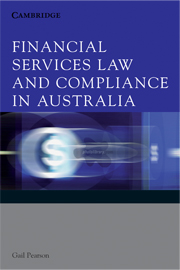Book contents
- Frontmatter
- Contents
- Preface
- List of Abbreviations
- Table of Statutes
- Table of Cases
- 1 The financial citizen and the market
- 2 The regulatory structure
- 3 An overview of financial services reform
- 4 Licensing financial services providers
- 5 The role of disclosure in the distribution of financial products
- 6 Selling financial products and other conduct
- 7 Deposit-taking and payments
- 8 Investment
- 9 Insurance
- 10 Consumer credit
- 11 Superannuation
- 12 Compliance, enforcement and remedies
- Index
- References
12 - Compliance, enforcement and remedies
Published online by Cambridge University Press: 05 June 2012
- Frontmatter
- Contents
- Preface
- List of Abbreviations
- Table of Statutes
- Table of Cases
- 1 The financial citizen and the market
- 2 The regulatory structure
- 3 An overview of financial services reform
- 4 Licensing financial services providers
- 5 The role of disclosure in the distribution of financial products
- 6 Selling financial products and other conduct
- 7 Deposit-taking and payments
- 8 Investment
- 9 Insurance
- 10 Consumer credit
- 11 Superannuation
- 12 Compliance, enforcement and remedies
- Index
- References
Summary
We use the right regulatory tool to achieve the best outcome.
Compliance
The best support and protection for financial citizens is compliance by financial services providers. When FSR was introduced, ASIC stressed the importance of locating the compliance function close to the directors of firms. The emphasis on compliance did lead to some actors exiting the financial services industry. At this time, it was believed that a disclosure-based regulatory regime would reduce the ‘compliance burden’ for firms. Instead, industry was assiduous in producing disclosure documents that were extremely lengthy, begging the ‘clear, concise and effective’ requirement. There was also an orchestrated campaign about the cost to industry of complying with the FSR obligations. This involved concern about the cost of financial services levies, estimates of the cost to obtain a licence, and complaints about the cost of producing disclosure documents. There tends to be less industry concern at the cost of the self-regulatory systems. Concern with red tape and the regulatory burden was echoed in the Banks Inquiry, and resulted in changes to the law for disclosure. Encouragement towards compliance is explicitly built into legislation, particularly through licence obligations. This involves shifting the regulatory focus from the responsibilities of the regulator to the obligations of the provider. Here, self-regulation plays an important role. ASIC provides extensive support for industry compliance through its Regulatory Guidance documents, which are readily and publicly available. When voluntary compliance fails, the role for the regulator turns to enforcement.
- Type
- Chapter
- Information
- Financial Services Law and Compliance in Australia , pp. 496 - 546Publisher: Cambridge University PressPrint publication year: 2009



